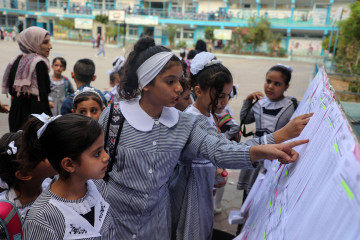

Mohammed Ashour (6) was unable to join other children his age as they start primary school this autumn after his parents were told that he cannot enrol in a school run by the United Nations Relief and Works Agency for Palestinian Refugees (UNRWA) in the Gaza strip, according to new procedures which affect a segment of the population known locally as mahareem ('deprived').
Mohammed is not the only child who has been unable to register in an UNRWA school: there are many others like him whose mothers are registered refugees, and whose siblings have always been treated as refugees and were registered in the agency's schools.
The label 'mahareem' is used for Palestinian families who benefit from UNRWA services and who have been categorised by the agency as 'poor', which formerly allowed them access to health, education and other relief services without their being formally registered as refugees.
"Specialists see this step as part of UNRWA's attempt to scale back its services. Children who are listed on one of their parents' ration cards and who would have previously been eligible to attend an agency school are being refused entry"
The agency would stamp the children's birth certificates to show their eligibility for UNRWA's services. However, recently this procedure has been revoked, which intends to stop new generations from benefitting from UNRWA's services.
Specialists see this step as part of UNRWA's attempt to scale back its services. Children who are listed on one of their parents' ration cards and who would have previously been eligible to attend an agency school are being refused entry.
They are now being considered 'citizens' – a category excluded from UNRWA's services which from now on will only be accessible to ration cardholders. This means they cannot attend UNRWA schools like their siblings did, which is leading to tension within families, and also that their allocation of food assistance is withdrawn.
|
|
Amal al-Dahshan, Muhammed's mother, says that she was categorised as 'poor' by UNRWA, and she and her children had benefitted from various services even though her children were never formally registered as refugees. However, recently, she has faced a number of problems.
"I have three children. My son Anas and daughter Nasima enrolled in UNRWA schools. However, I was surprised that my youngest son, Muhammad, was not allowed to enrol, given that I am in this category, although I am married to a non-refugee, while my brothers, who are in the same category, still benefit from the agency’s services".
Al-Dahshan explains to Al-Araby Al-Jadeed, The New Arab’s Arabic-language sister publication, that she and her family have suffered from the reduction in education, relief and health services that UNRWA used to provide.
"We were forced to register Muhammed in a government school even though it's far from us. He is also upset that his brother and sister are at the UNRWA school and he can’t go with them – it is taking a toll on his mentally".
"What is happening to the group known as the mahareem should be condemned in the strongest terms because of the devastating effect it will have on a large section of the Palestinian population, and on the services offered to 250,000 Palestinian children who are being deprived of nutrition, healthcare and education"
Safa 'Ayad is also in the 'poor' category as designated by UNRWA, and her children were always treated as refugees. Four of her children went to UNRWA schools, however the agency refused to stamp the birth certificate of her youngest son Ziad, which excludes him from any agency services – food, relief or access to an UNRWA school.
'Ayad explains: "The UNRWA reductions have happened in stages. My first son Omar's birth certificate was given an official stamp; then with my next two children, Alaa and Amer, the agency stamped my birth certificate to show they had access to services; then they refused to stamp my son Asem's birth certificate, but he was still treated as a refugee and registered in a UNRWA school. However, with my youngest son Ziad, they refused to stamp his birth certificate and refused to give him access to any services".
Sameer Abu Mudallalah, a researcher in refugee issues, confirms that UNRWA's mandate is to offer education, health and relief services to carriers of UNRWA ration cardholders. He explains: "The agency has been shrinking down its services for years now in several areas, most importantly health and education.
"What is happening to the group known as the mahareem should be condemned in the strongest terms because of the devastating effect it will have on a large section of the Palestinian population, and on the services offered to 250,000 Palestinian children who are being deprived of nutrition, healthcare and education. This is a very worrying situation which signals even further deprivation to come".
According to Abu Mudallalah these steps are in line with American pressure for UNRWA to stop treating new generations in refugee families as refugees and prevent them from access to the agency's services. He emphasises the heavy toll this step will take on children’s mental health in Gaza.
This is an edited translation from our Arabic edition. To read the original article click here.
Translated by Rose Chacko





 Follow the Middle East's top stories in English at The New Arab on Google News
Follow the Middle East's top stories in English at The New Arab on Google News


